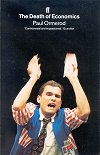
The economy is like society itself, he argues: a complex system living on the edge of chaos. Conventional economics has always failed to predict and manage its fluctuations. Governments and businesses need to adopt quite different mindsets and less heavy-handed approaches. Hence ‘Butterfly Economics’.
Most economic theories treat people as rational agents who know what they want, and act to maximise their own utility. But real people aren’t like that. They copy what other people do, they follow fashion, and when new products appear, they have to discover from scratch what their wants are. What would an economics that included this feature look like?
Ormerod’s exploration of this question starts off with a simple model of foraging ants, that can choose to follow other ants, or choose to change their minds spontaneously. Such simple concepts can provide models that better describe observed economic behaviour than do the classical ones, but it has been infeasible to study them until now, because they require computer simulations to discover the results. What these new models demonstrate is that short term attempts to control the economy are doomed to failure, and government interventions are basically futile. But governments shouldn’t worry – Ormerod points out what they could be doing that would have long term benefits. He also has some delightfully acidic comments to make about classical economics, and economists, on the way.
Fun to read, and enlightening.
Paul Ormerod draws upon recent advances in biology to help us understand the surprising consequences of the iron Law of Failure. And he shows what strategies corporations, businesses and governments will need to adopt to stand a chance of prospering in a world where only one thing is certain.
Here Ormerod launches savage attack on classical economic theory. He goes through the various axioms (rational agents, perfect information, equilibrium, Gaussian distributions, and the like), and demonstrates not only that they are not true, but that they couldn’t possibly be true. He gives examples of various classical economic theories (including recent Nobel Prize-winning ones) have been empirically falsified in no uncertain terms.
He bemoans the fact that, nevertheless, many of these theories are still taught to economics students as if they were true. It’s as if physics departments still taught about phlogiston and the luminiferous aether, or medical schools still taught the four humours!
He is particularly scathing of economists’ reactions when theory and observations don’t match. One lovely anecdote is of an experiment were two senior members of the RAND Corporation were asked to play Prisoner’s Dilemma, and did not play ‘optimally’.
Ormerod also discusses various textbook economic rules like “set price equal to marginal costs”, and shows how it is simply impossible to calculate the components of marginal cost (there are just too many imponderables, not least of which is how those pesky irrational consumers will react), and that one of the underlying assumptions is also not necessarily true. He is scathing about the way modern economics textbooks water down, or omit, many of these difficulties.
The focus is on why businesses fail. Most businesses fail. And, after the first few rocky set-up years, the failure rate is essentially independent of the age or the size of the business. It follows one of those power laws ubiquitous in complex systems, similar to the way species undergo extinctions. The interdependence of businesses (ignored in classical economic theory, of course) can lead to extinction avalanches, even with no obvious external ‘cause’. Ormerod investigates further, and comes to the conclusion that such a rate of business failure is actually a Good Thing, wiping out the ponderous, the inefficient (and the plain unlucky), and allowing new, innovative, potentially more efficient businesses the room to enter the market.
As he notes, there is a serious problem here: current government policies and economic legislation are predicated on these demonstrably false economic theories. In particular, the the idea of competitors selling identical products at minimum profit encourages legislation that stifles innovation:
This was written before the Credit Crunch of 2008. It is depressing to see the governments of the world scrabbling to return things to the prior status quo based on these incorrect theories, particularly in their rescuing of large, inefficient industries whose products they were, and are still, demonising as a major contributor to global warming. In Ormerod’s analysis, we’ve just been through a major extinction event, and had things had been allowed to run their course, we should be seeing a Cambrian Explosion of new, innovative, exciting industries ready to leap into the vacant niches. (I am not suggesting that GM, Land Rover, et al should have been allowed to collapse, and the workers starve. I am suggesting that they should have been allowed to collapse, and the bailout instead used for retraining, investment in new industries, infrastructure, and moving forward.)